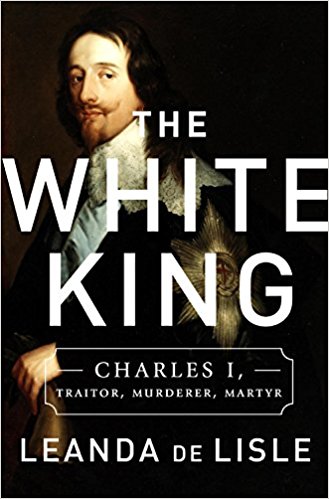By Patrick Hunt –
Readers used to courtly fanfare in larger than life Tudor and Jacobean characters – Henry VIII, Elizabeth I, Mary Queen of Scots and even James I – largely assume a life with only a few cornets pealing around Charles I, however peevish and absolutist his history appears to be usually writ. With such lower expectations, the biography of Charles is too often held in unsympathetic ransom within the grasp of a sanctimonious Oliver Cromwell who badly wanted others to believe in his divine timeliness. Yet religious persecution was not just the tool of Charles, it was also employed in Cromwell’s arsenal.
That is why this new balanced biography of Charles I, Leanda de Lisle’s The White King is so marvelous. It blows away the partisan fog and presents such an immediately recognizable human that all previous tellings look like caricature.
That Charles could be named as traitor and murderer by one camp and raised up as a martyr by its opposing equally valid claimants to historicity is perfectly reasonable given not just the wars of succession from one dynasty to the other, but also given the brutal suppression of either Catholic or Protestant religious persuasion leading to bloodbaths that were as much central events as sideshows to power struggles in the age. No one seeking a throne – even when in the bloodline – was ever solely angelic in pursuit of whatever means necessary to that end. A halo rarely fits a king or queen very well, nor equally a so-called Protector or Pretender. The “White King ” epithet of Charles as the only regent ever crowned in white and buried in a snowstorm are rightly challenged, yet the epithet remains as a part of the confounding myth of Charles to the present.
The White King (released in October 2017 by Perseus / Public Affairs; Chatto and Windus in U.K., 2018) renders sufficiently broad strokes of macro history but is also microscopically filled with careful archival detail only the best historians can dig up and make come alive almost effortlessly. It is highly provocative and sustains interest for page after page with intrigues and colorful parliamentary fracas. Some of my favorite passages may seem at first to be only be background fill but are enormously revealing of equal Royalist and Roundhead peccadillo and make the story complete and more plausible. For me the most droll yet delightful read was Chapter 22 (Part Four: Nemesis) “The Red-Haired Mistress” relating Jane Whorwood’s sad but somewhat distracting role of lover and spy during Charles’ late imprisonment. Religion and politics are a flammable mix in this ignominious era of Christendom many would rather forget, but the morality here is a more mature gray than the marginalized black and white of hypocrisy. This is incisive, razor-sharp writing but with deft feeling, presenting Charles I as a controversial but wholly realistic figure – both pathetic yet deeply human in a polished biographical gem that is sympathetic in such a way we cannot help but identify with his tragedy, deserved or not. The White King carefully integrates reliable new source documentation – including lost letters from a previously closed privately owned archive at Belvoir Castle – and capable critical analysis about Charles in fairer terms than either Tudor or Stuart courtiers stingily caricatured or other modern biographers conceived. It will be definitive for a long time.
(Patrick Hunt’s biography of Hannibal was just released by Simon and Schuster, July, 2017. Hunt is a historian covering Classical antiquity to the Renaissance. He is a member of the Archaeological Institute of America since 1984, the Renaissance Society of America since 2006, a Fellow of the Royal Geographical Society since 1989, the California Classical Association since 1984 and the Society for Military History since 2015. He is affiliated with the Center for Medieval and Modern Studies at Stanford University and the Center for Medieval and Renaissance Studies at UCLA. His Ph.D. in 1991 is from the Institute of Archaeology, UCL (London) and he is also an Expeditions Expert for National Geographic Expeditions. His previous biographies include Caravaggio, Haus Publishing, London, 2004; other published books include Ten Discoveries That Rewrote History, Penguin Group 2007.)
[Advance copy Received for Review]
